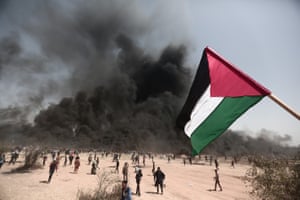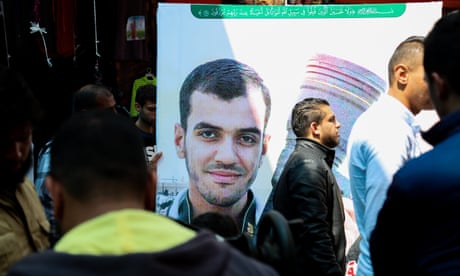Yasser Murtaja embodied the struggle of Gazans – desperate yet defiant

Yasmeen el Khoudary, Theguardian – For the past 11 years, Gaza has regularly featured in headlines as the target of three military onslaughts, an ongoing siege and a humanitarian disaster. Less reported has been the scream of an entire generation pleading for help, their scream falling on deaf ears.
Yasser Murtaja, a Gazan journalist, was a member of that generation – a generation that has largely been confined within the military-fortified fences that surround Gaza from all sides, a generation for whom the right to travel freely remains a distant illusion.
Israels defence minister, Avigdor Lieberman, said last week that there were ‘no innocent people’ in Gaza
Yasser was shot by an Israeli sniper on Friday, while covering the second Great March of Return. The bullet hit him in the abdomen, the only area not covered by his clearly marked “Press” jacket. He died a few hours later.
Two weeks before his death, Yasser wrote on his Facebook page: “I dream that the day when I can capture this photo from the sky and not from the ground will come. My name is Yasser Murtaja. I am 30 years old. I live in Gaza. I have never travelled!”
Yasser tried repeatedly to apply for the right to travel out of Gaza, but each attempt failed. He was widely mourned by his friends and colleagues, the vast majority of whom, like him, have never in their lives been outside of Gaza. His generation was born into the first intifada, witnessed the second intifada, survived three major Israeli military onslaughts on the Gaza Strip, and continue to live under siege. Moreover, of the 2 million people who live in Gaza, two-thirds are descendants of refugees from nearby towns and villages that were destroyed upon the creation of Israel in 1948, and all are victims of an ongoing Israeli blockade that has turned Gaza into the worlds largest open prison.
 [contfnewc]
[contfnewc]FacebookTwitterPinterest[contfnewc]
The first Friday of the march, which is inspired by the right of return of these refugees, was attended by more than 30,000 unarmed civilians, who set up tents along the frontier and engaged in alternative means of resistance, such as reading, singing and dancing, in a scene reminiscent of the early days of Tahrir Square. The nonviolent nature of the march did not deter Israeli snipers, lined up behind the security fence, from killing at least 16 protesters and injuring more than 750. Yet, despite the high number of casualties, thousands marched to the border the following Friday, in an impressive display of defiance. At least nine more were killed, yet the risks are unlikely to dissuade people from going again next Friday.
 [contfnewc]
[contfnewc]
Gaza photographer’s last video captures brutal crackdown on protests
[contfnewc]
[contfnewc]
Read more[contfnewc]
[contfnewc]
[contfnewc]
[contfnewc]
Israels defence minister, Avigdor Lieberman, said last week that there were “no innocent people” in Gaza, justifying Israels targeted shooting at unarmed civilians. Put simply, Palestinians in Gaza are being left with nothing to lose. Decades of life under siege and occupation have turned the territory into a disaster zone. Almost every aspect of Gazas unbearable situation, which has fuelled this protest, could have been avoided had the world forced Israel to respect Palestinian rights and to comply with international law. Yet other governments did little to acknowledge that the innocent are being collectively punished in Gaza.
The time has surely come for the people of Gaza to take matters into their own hands, and the ongoing march is a powerful representation of that will. Its organisers are activists who are unaffiliated with any political group. Thousands of people from all walks of life have attended, carrying nothing but the Palestinian flag. They are united not just by their frustration, desperation and loss of hope, but also in their strong desire to live a dignified life; a desire so strong that even the fear of death does not deter it.
As for Yasser, his 30-year dream of leaving Gaza has finally been realised; he has left it for ever, but without seeing any other place in the world. He left behind 2 million people who will continue to share his dream, but for how much longer?
• Yasmeen el Khoudary is an independent Palestinian researcher and writer
[contfnewc]
I appreciate there not being a paywall: it is more democratic for the media to be available for all and not a commodity to be purchased by a few. Im happy to make a contribution so others with less means still have access to information.Thomasine, Sweden
[contfnewc]
[contfnewc]
[contfnewc]



